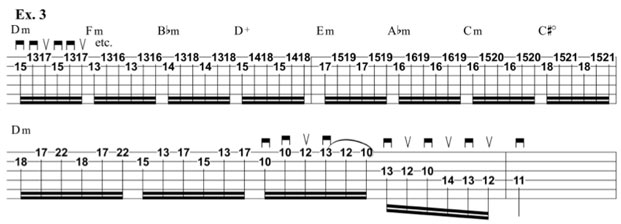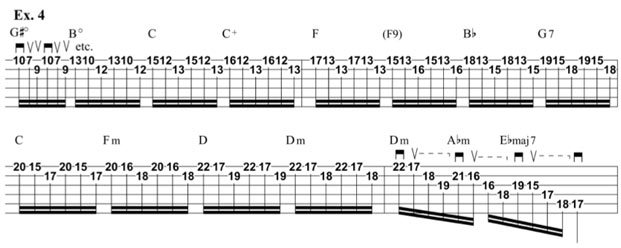Diminished Arpeggios: Using Small Arpeggio Shapes and Inversions
Develop your technique, and make your solos more musical and expressive.

Greetings, minions! Baron Taurean Helleshaar here from Lords of the Trident.
As a long-time and avid reader of Guitar World, writing this column is very exciting and a great honor for me! Over the next few months, I'll go over a variety of ideas for developing technique as well as making solos more musical and expressive.
Sweep picking has become the new gold standard technique for rock and metal guitarists in recent years. I’ve noticed many players who “swing for the fence” so to speak, and dive right into flashy five- and six-string arpeggio shapes without first getting a handle on smaller arpeggios. It is essential to start small and build a solid foundation of the sweeping technique. As Mr. Miyagi says, “First learn stand, THEN learn fly.”
EXAMPLE 1A shows two basic sweeps using the E minor shape on the E and B strings. Pay close attention to the picking patterns and notice there are no hammer-ons or pull-offs. The goal here is maximum pick control. Any time there are two up or down strokes in a row, they should be executed as a single smooth motion, not two successive pick motions.
To isolate the picking hand, use your fretting hand to mute the strings (EXAMPLE 1B), giving you a percussive click for each note. You should now be able to very clearly hear every attack as you break out your old nemesis—the metronome. If the picking is inconsistent, the results will be less than satisfactory regardless of what the fretting hand is doing. Try this muted picking on all the pairs of strings.

EXAMPLE 2 is a reference list of all the inversions of the four basic triad types in C. Memorizing these shapes is crucial to breaking out of predictable position playing as well as gaining a better understanding of the fretboard. These arpeggios are written descending, but should also be practiced ascending.
These picking patterns may also be referred to as economy picking. I’m not so concerned about labeling the technique as much as the benefit it gives to executing larger arpeggio patterns. As an added bonus, when you decide to include hammer-ons and pull-offs with these, your speed will increase dramatically!
All the latest guitar news, interviews, lessons, reviews, deals and more, direct to your inbox!
Here are two etudes to help you apply these inversions.

EXAMPLE 3 has a black metal sound with minor chords being moved around, but never uses the same chord inversion twice in a row. The chord progression utilizes common tones in almost all of the changes. For example, the F is shared from the D minor to the F minor, and then also to the Bb minor. The Bb remains from the Bb minor into the D augmented, and so on. This is known as smooth voice leading.

The second measure of EXAMPLE 4 demonstrates that this picking may also be applied to scalar patterns, specifically on beat 2. The last measure is a sneak peak into where this technique will be going in the next blog as we expand the length of the sweep. Up the horns and stay metal!

Baron Taurean Helleshaar is a roaming sell sword and scholar of the forbidden “Music of the Arcane." He has formed an allegiance with the Lords of the Trident while remaining in exile from his home in the Northern Kingdom. His mortal alter ego, Brian Koenig, is lead guitarist for the band Lords of the Trident and teaches music privately in Madison, Wisconsin. He was a founding member of Luna Mortis (Century Media) and has toured the U.S. and Canada. He holds a master's of music in composition from the University of North Carolina at Greensboro and a bachelor's of music in music theory and history from the University of Wisconsin Whitewater.
